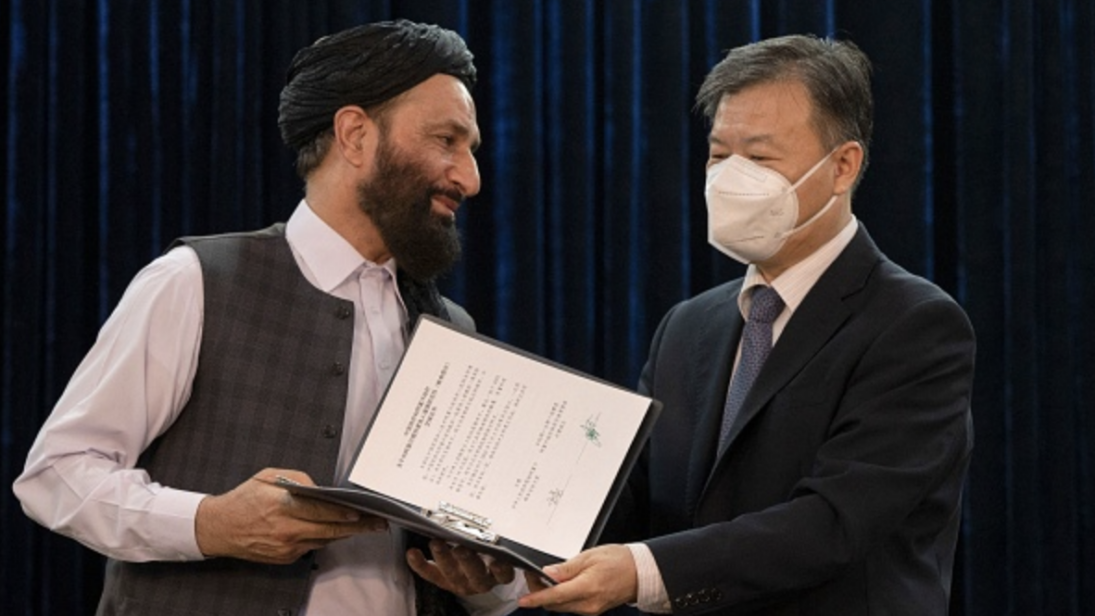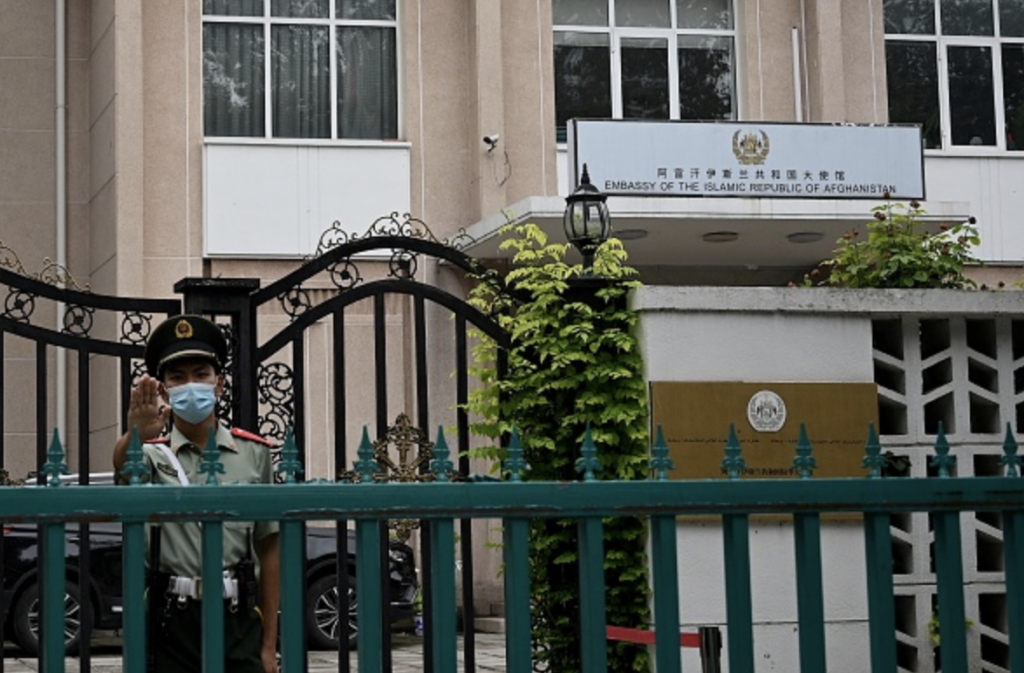
On September 13, the first containers departed China en route to Afghanistan via Central Asian countries. The launching of the new railroad line is likely to open economic trade routes for the Taliban-led government in Afghanistan. As the West adheres to its sanctions regime against Taliban leadership in Afghanistan, China has urged ending unilateral sanctions against the Taliban and has exempted tax from the majority of Afghan imports. The hasty U.S. troop withdrawal from Afghanistan has inevitably granted China the maneuverability to exert its economic and strategic interests in the country.
As the new Taliban regime is fixated on achieving international recognition and establishing formal partnerships with regional countries, China has expressed a willingness to engage with the Taliban to receive security assurances and further its economic agenda in the country. Beijing’s actions in Afghanistan could cement its position in the region as an economic provider and succeed the United States as the main partner for the region.
Working with the Taliban: A Long Time in the Making
China’s utmost priority in Afghanistan is ensuring that the country remains steadfast in its intention to target terrorist groups hostile to Chinese interests in the region. China has been concerned over Afghanistan’s potential to become a haven for extremist groups with ties to the Xinjiang Uyghur Autonomous Region. For instance, China has not recalibrated its designation of the East Turkistan Islamic Movement (ETIM) as a terrorist organization despite its removal from the U.S. Terror List. This is likely due to Afghanistan’s narrow, 90-kilometer-long Wakhan corridor, which is geographically pressed between Pakistan and Tajikistan, providing passage into Xinjiang. The physical proximity to China’s affected areas and the historical linkages between ETIM and the Taliban have forced China to find common ground with the Taliban.
Beijing’s actions in Afghanistan could cement its position in the region as an economic provider and succeed the United States as the main partner for the region.
At the turn of the last decade, the United States had expressed its interest in withdrawing from Afghanistan via a gradual reduction in the number of boots on the ground, triggering China’s initial Taliban outreach. In December 2014, China hosted a Taliban delegation in Beijing to mediate between the Afghan government and the Taliban—although unconfirmed by Chinese officials. In 2015, China hosted the Taliban and Afghanistan’s High Peace Council. In the past year, Chinese special envoys have traveled to Kabul, including a surprise visit by Chinese Foreign Minister Wang Yi in March 2022. China has also turned to multilateral forums to discuss the Afghan situation and engage with the Taliban. Various discussions between the two delegations have involved cooperation on counterterrorism, invigorating a sanctions-battered slumping economy, increasing bilateral trade, and improving visa regulations to resume infrastructure investment. Curtailing terrorist threats is the mainstay of China’s Taliban overtures. Without overcoming this obstruction, the China-Afghanistan needle cannot move forward.
However, the security threat emanating from Afghanistan is not limited to the ETIM. Al-Qaeda and Tehrik-e-Taliban Pakistan (TTP) also pose a visible threat to China, including in neighboring Pakistan, which has heavy Chinese investments. Despite public promises to uproot terrorism from Afghan soil, the drone attack on Ayman al-Zawahiri and the role of Haqqani Network leaders in the Taliban-led government indicate that extremist leaders could still exude some influence and move freely within Afghanistan.
The Islamic State Khorasan Province (ISKP) has added to the complexity. ISKP has accused the Taliban of “selling out” to China and the United States for engaging in negotiations with the international community. China is also alarmed by ISKP’s latest propaganda campaigns that rake up the Uyghur issue. If ISKP remains a credible threat to the Taliban and China, the two will need to coordinate to eliminate the organization and rein in stability in the region.
Securing China’s Economic Interests
ISKP’s ante against China has increased. The terrorist organization aims to disrupt China’s “imperialist” ambitions by attacking its pet project, the Belt and Road Initiative (BRI). China seeks to use the BRI format to heavily invest in infrastructure and design a network of partner countries around the globe.
In Afghanistan, this means exploiting $1-3 trillion worth of mineral deposits, including attaining control over highly coveted rare earth elements (REE). These elements are critical for the development of advanced weapon systems and communication. China already controls 95 percent of mined production and refining REEs worldwide. Achieving access to resource-rich Afghanistan would benefit China’s economic ambitions and secure itself as a reliable and stable economic partner for Central and South Asian nations.
However, China’s ambitions to tap into Afghanistan’s mineral-rich deposits have largely remained elusive due to the chaos and will likely remain so until stability ensues.

China-Taliban Relations and South Asia
China’s ability to influence the Taliban will give the world insight into whether China will be able to challenge the United States and establish itself as the new regional power. For now, it is a region-by-region test and Afghanistan will be key to China’s dominance in both South and Central Asia.
China’s muscle-flexing in the region—such as island building in the South China Sea and ongoing pressures on the Line of Actual control between China and India—have created tensions in the region. China has already expanded its sphere of influence into South Asia as Pakistan is now China’s most trusted partner in the region. With the advent of the BRI, China’s ability to influence Afghanistan, a gateway to South and Central Asia, would set the tone for China’s growing dominance in the region. While China is not looking to intervene in the country, any successful negotiation with the Taliban would be another victory for Beijing in promoting itself in the South Asia region.
The implication of growing Chinese influence in Afghanistan is not lost on other countries, particularly India and the United States, which both see Afghanistan as critical to their national security and are at loggerheads with China to secure their interests in the region. India, contrary to many predictions, has not shied away from reaching out to the Taliban despite its previously close ties to the Afghan government. Reopening its embassy in Kabul, offering humanitarian aid, positioning itself as an alternative to China as a source of funding, and securing multiple meetings with Taliban officials, both openly and secretly, are triggered by its fears of the Taliban extending support to terrorist groups operating in Kashmir. India is also concerned about losing the diplomatic and economic inroads made over the last two decades. India’s loss would mean Pakistan’s gain of ‘strategic depth’. On the other hand, the U.S. rapprochement has been much slower, but its continued interest is proven by the drone strike on al-Zawahiri. With growing ISKP presence, the United States will rely on direct negotiations with the Taliban. To that extent, India and the United States might even find themselves on the same side.
A Two-way Romance: Why the Taliban Needs China
Afghanistan is cash-strapped under Taliban leadership due to pressing international sanctions and diplomatic isolation. Barring humanitarian aid, Kabul’s assets remain frozen while countries mull collaborating with the Taliban while also curtailing the flow of funds to terrorist groups. Taliban Political Office Head in Doha, Suhail Shaheen, referred to China as a “friend” and discussed the need to resume talks on investing in reconstruction work “as soon as possible.”
The implication of growing Chinese influence in Afghanistan is not lost on other countries, particularly India and the United States, which both see Afghanistan as critical to their national security and are at loggerheads with China to secure their interests in the region.
The ongoing sanctions are not the only limiting factor for the Taliban government. It still requires formal recognition to distinguish itself from its previous era of ruling Afghanistan. China’s support not only comes in the form of large-scale investments and infrastructure development in Afghanistan, but cooperation between the two countries can also open doors for Afghanistan under the Taliban. Other countries might feel more confident about working with Afghanistan after learning of the Chinese willingness to engage in the country. It might not mean immediate formal recognition but a place on the global stage.
The Spoilers: Threats to its Economic and Strategic Interests
Despite shared interests between China and the Taliban, points of contention remain. While the Taliban has promised its interest in countering terrorism, it has only relocated ETIM militants. It is also yet to cut off ties with THE TTP and Baloch ethnic-separatist groups. These groups pose a threat to Islamabad, which is closely aligned with Beijing, and threaten BRI investments in Pakistan. For instance, the Baloch Liberation Army (BLA) has launched recent attacks on Chinese nationals and Chinese assets in Gwadar and Karachi. To secure its immediate security concerns and long-term economic plans, China is multitasking in Afghanistan. Beijing is occupied with building infrastructure, providing humanitarian aid, and possibly formally recognizing the Islamic Emirate of Afghanistan. Any attempt at elevating its status as a regional power would then be a “‘test case’ for a China-led world.”
***
Image 1: Wakil Kohsar/AFP via Getty Images
Image 2: Noel Celis/AFP via Getty Images


